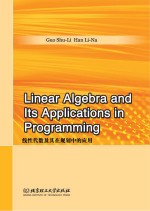图书介绍
线性代数及其在规划中的应用【2025|PDF|Epub|mobi|kindle电子书版本百度云盘下载】

- 郭树里,韩丽娜主编 著
- 出版社: 北京:北京理工大学出版社
- ISBN:9787568239691
- 出版时间:2017
- 标注页数:271页
- 文件大小:36MB
- 文件页数:285页
- 主题词:线性代数-高等学校-教材-英文;线性规划-高等学校-教材-英文
PDF下载
下载说明
线性代数及其在规划中的应用PDF格式电子书版下载
下载的文件为RAR压缩包。需要使用解压软件进行解压得到PDF格式图书。建议使用BT下载工具Free Download Manager进行下载,简称FDM(免费,没有广告,支持多平台)。本站资源全部打包为BT种子。所以需要使用专业的BT下载软件进行下载。如BitComet qBittorrent uTorrent等BT下载工具。迅雷目前由于本站不是热门资源。不推荐使用!后期资源热门了。安装了迅雷也可以迅雷进行下载!
(文件页数 要大于 标注页数,上中下等多册电子书除外)
注意:本站所有压缩包均有解压码: 点击下载压缩包解压工具
图书目录
Part Ⅰ3
Chapter 1 Background and Fundamentals of Mathematics3
1.1 Basic Concepts3
1.2 Relations4
1.3 Functions5
1.4 The Integers9
1.4.1 Long Division9
1.4.2 Relatively Prime10
1.4.3 Prime10
1.4.4 The Unique Factorization Theorem11
Chapter 2 Groups13
2.1 Groups13
2.2 Subgroups15
2.3 Normal Subgroups17
2.4 Homomorphisms19
2.5 Permutations20
2.6 Product of Groups22
Chapter 3 Rings24
3.1 Commutative Rings24
3.2 Units25
3.3 The Integers Mod N26
3.4 Ideals and Quotient Rings27
3.5 Homomorphism28
3.6 Polynomial Rings29
3.6.1 The Division Algorithm30
3.6.2 Associate31
3.7 Product of Rings32
3.8 Characteristic33
3.9 Boolean Rings34
Chapter 4 Matrices and Matrix Rings35
4.1 Elementary Operations and Elementary Matrices35
4.2 Systems of Equations36
4.3 Determinants37
4.4 Similarity40
Part Ⅱ45
Chapter 5 Vector Spaces45
5.1 The Axioms for a Vector Space45
5.2 Linear Independence,Dimension,and Basis48
5.3 Intersection,Sum and Direct Sum of Subspaces53
5.4 Factor Space56
5.5 Inner Product Spaces58
5.6 Orthonormal Bases and Orthogonal Complements62
5.7 Reciprocal Basis and Change of Basis65
Chapter 6 Linear Transformations71
6.1 Definition of Linear Transformation71
6.2 Sums and Products of Liner Transformations75
6.3 Special Types of Linear Transformations77
6.4 The Adjoint of a Linear Transformation82
6.5 Component Formulas89
Chapter 7 Determinants And Matrices92
7.1 The Generalized Kronecker Deltas and the Summation Convention92
7.2 Determinants96
7.3 The Matrix of a Linear Transformation99
7.4 Solution of Systems of Linear Equation102
7.5 Special Matrices103
Chapter 8 Spectral Decompositions108
8.1 Direct Sum of Endomorphisms108
8.2 Eigenvectors and Eigenvalues109
8.3 The Characteristic Polynomial110
8.4 Spectral Decomposition for Hermitian Endomorphisms113
8.5 Illustrative Examples124
8.6 The Minimal Polynomial127
8.7 Spectral Decomposition for Arbitrary Endomorphisms130
Chapter 9 Tensor Algebra144
9.1 Linear Functions,the Dual Space144
9.2 The Second Dual Space,Canonical Isomorphisms149
Part Ⅲ157
Chapter 10 Linear Programming157
10.1 Basic Properties of Linear Programs157
10.2 Many Computational Procedures to Simplex Method162
10.3 Duality170
10.3.1 Dual Linear Programs170
10.3.2 The Duality Theorem172
10.3.3 Relations to the Simplex Procedure173
10.4 Interior-point Methods176
10.4.1 Elements of Complexity Theory176
10.4.2 The Analytic Center176
10.4.3 The Central Path177
10.4.4 Solution Strategies180
Chapter 11 Unconstrained Problems187
11.1 Transportation and Network Flow Problems187
11.1.1 The Transportation Problem187
11.1.2 The Northwest Corner Rule190
11.1.3 Basic Network Concepts190
11.1.4 Maximal Flow191
11.2 Basic Properties of Solutions and Algorithms197
11.2.1 First-order Necessary Conditions197
11.2.2 Second-order Conditions198
11.2.3 Minimization and Maximization of Convex Functions198
11.2.4 Zeroth-order Conditions198
11.2.5 Global Convergence of Descent Algorithms199
11.2.6 Speed of Convergence202
11.3 Basic Descent Methods204
11.3.1 Fibonacci and Golden Section Search204
11.3.2 Closedness of Line Search Mgorithms205
11.3.3 Line Search207
11.3.4 The Steepest Descent Method209
11.3.5 Coordinate Descent Methods211
11.4 Conjugate Direction Methods212
11.4.1 Conjugate Directions212
11.4.2 Descent Properties of the Conjugate Direction Method214
11.4.3 The Conjugate Gradient Method214
11.4.4 The C-G Method as an Optimal Process215
Chapter 12 Constrained Minimization218
12.1 Quasi-Newton Methods218
12.1.1 Modified Newton Method218
12.1.2 Scaling219
12.1.3 Memoryless Quasi-Newton Methods222
12.2 Constrained Minimization Conditions223
12.2.1 Constraints223
12.2.2 Tangent Plane224
12.2.3 First-order Necessary Conditions(Equality Constraints)224
12.2.4 Second-order Conditions225
12.2.5 Eigenvalues in Tangent Subspace225
12.2.6 Inequality Constraints227
12.2.7 Zeroth-order Conditions and Lagrange Multipliers228
12.3 Primal Methods231
12.3.1 Feasible Direction Methods231
12.3.2 Active Set Methods231
12.3.3 The Gradient Projection Method232
12.3.4 Convergence Rate of the Gradient Projection Method233
12.3.5 The Reduced Gradient Method235
12.4 Penalty and Barrier Methods237
12.4.1 Penalty Methods237
12.4.2 Barrier Methods238
12.4.3 Properties of Penalty and Barrier Functions239
12.5 Dual and Cutting Plane Methods243
12.5.1 Global Duality243
12.5.2 Local Duality245
12.5.3 Dual Canonical Convergence Rate247
12.5.4 Separable Problems248
12.5.5 Decomposition248
12.5.6 The Dual Viewpoint249
12.5.7 Cutting Plane Methods251
12.5.8 Kelley's Convex Cutting Plane Algorithm253
12.5.9 Modifications253
12.6 Primal-dual Methods254
12.6.1 The Standard Problem254
12.6.2 Strategies256
12.6.3 A Simple Merit Function257
12 6 4 Basic Primal-dual Methods257
12.6.5 Modified Newton Methods260
12.6.6 Descent Properties262
12.6.7 Interior Point Methods263
Bibliography267
热门推荐
- 655184.html
- 3650958.html
- 787545.html
- 35054.html
- 3908044.html
- 1662105.html
- 1908317.html
- 3170022.html
- 184884.html
- 2114604.html
- http://www.ickdjs.cc/book_2548214.html
- http://www.ickdjs.cc/book_166854.html
- http://www.ickdjs.cc/book_1808747.html
- http://www.ickdjs.cc/book_2313015.html
- http://www.ickdjs.cc/book_1209031.html
- http://www.ickdjs.cc/book_1771857.html
- http://www.ickdjs.cc/book_1852918.html
- http://www.ickdjs.cc/book_21032.html
- http://www.ickdjs.cc/book_3245569.html
- http://www.ickdjs.cc/book_229221.html